[牛津中小学英语网]can与could的用法及练习
英语中情态动词can和could的用法及例句
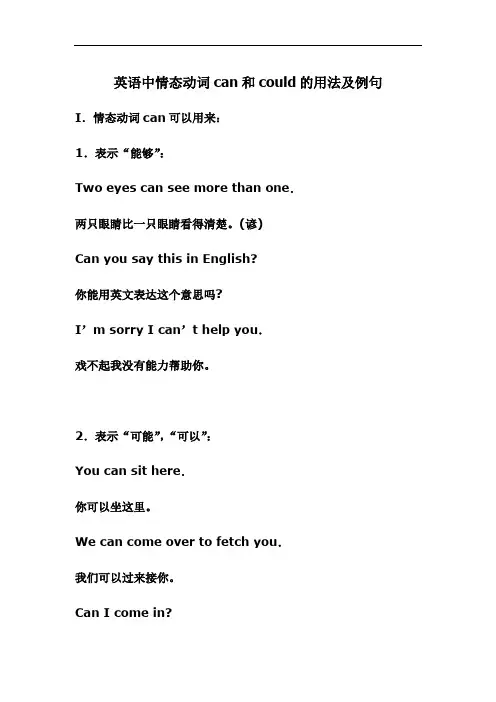
英语中情态动词can和could的用法及例句I.情态动词can可以用来:1.表示“能够”:Two eyes can see more than one.两只眼睛比一只眼睛看得清楚。
(谚)Can you say this in English?你能用英文表达这个意思吗?I’m sorry I can’t help you.戏不起我没有能力帮助你。
2.表示“可能”,“可以”:You can sit here.你可以坐这里。
We can come over to fetch you.我们可以过来接你。
Can I come in?我可以进来吗?3.(用在疑问及否定句中)表示惊异不可能等(后面有时可跟完成及进行形式):She can’t be serious.她不可能是当真的。
How call you be so silly?你怎么这样傻?Where can he have gone?他能到哪里去了呢?What can she be doing now?她现在能在干什么呢?II.情态动词could可以用来表示:1)能够:Nobody conld answer that question.没人能回答那个问题。
It was so dark,we couldn’t see anything.天那样黑我们什么也看不见。
2)可能,可以:He said he couldn’t come.他说他不能来。
I said we could go by boat.我说我们可以坐船去。
2.可以用来代替can,比较委婉地提出请求用法等(a)或是表示惊异不相信等(b):a.Could you do me a favor?你能帮我一个忙吗?We could send the parcel by air mail.这包裹可以航空寄去。
b.How could he be so rude?他怎么这样粗鲁无礼?They couldn’t have left so soon.他们不可能走得这么早。
can与could的用法详解及情态动词有关习题
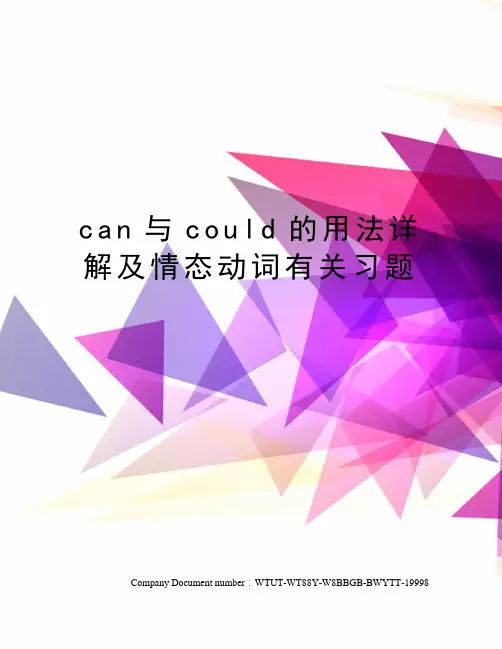
c a n与c o u l d的用法详解及情态动词有关习题Company Document number:WTUT-WT88Y-W8BBGB-BWYTT-19998can与could的用法详解一、表示能力(1)表示现在的能力,用can:My sister can drive. 我妹妹会开车。
Everyone here can speak English. 这儿人人会说英语。
(2)表示将来的能力,通常不用can或could,而用be able to的将来时态:I’ll be able to speak French in another few months. 再过几个月我就会讲法语了。
One day people will be able to go to the moon on holiday. 总有一天人们可以到月球上去度假。
但是,若表示现在决定将来是否有能力做某事,则可用 can:Can you come to the party tomorrow 你明天能来参加我们的聚会吗(3)表示过去的能力,有时可用could,有时不能用could,具体应注意以下几点:①若表示过去一般的能力(即想做某事就随时可做某事的能力),可用could:Could you speak English then 那时候你会说英语吗②若表示过去的特定能力(即在过去特定场合做某事的能力),则不能用could,而用w as (were) able to do sth,或用 managed to do sth,或用 succeeded in doing sth 等。
He studied hard and was able to pass the exam. 他学习很努力,所以考试能及格。
At last he succeeded in solving the problem. 他终于把那个问题解决了。
【注】could 不用来表示过去特定能力通常只限于肯定句,否定句或疑问句中,它则可以表示过去特定的能力:I managed to find the street, but I couldn’t find her house. 我想法找到了那条街,但没找到她的房子。
情态动词can和could的用法
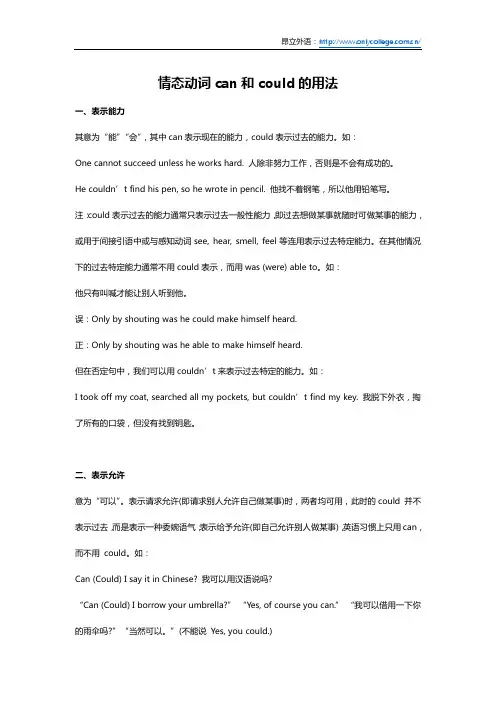
情态动词can和could的用法一、表示能力其意为“能”“会”,其中can表示现在的能力,could表示过去的能力。
如:One cannot succeed unless he works hard. 人除非努力工作,否则是不会有成功的。
He couldn’t find his pen, so he wrote in pencil. 他找不着钢笔,所以他用铅笔写。
注:could表示过去的能力通常只表示过去一般性能力,即过去想做某事就随时可做某事的能力,或用于间接引语中或与感知动词see, hear, smell, feel等连用表示过去特定能力。
在其他情况下的过去特定能力通常不用could表示,而用was (were) able to。
如:他只有叫喊才能让别人听到他。
误:Only by shouting was he could make himself heard.正:Only by shouting was he able to make himself heard.但在否定句中,我们可以用couldn’t来表示过去特定的能力。
如:I took off my coat, searched all my pockets, but couldn’t find my key. 我脱下外衣,掏了所有的口袋,但没有找到钥匙。
二、表示允许意为“可以”。
表示请求允许(即请求别人允许自己做某事)时,两者均可用,此时的could 并不表示过去,而是表示一种委婉语气;表示给予允许(即自己允许别人做某事),英语习惯上只用can,而不用could。
如:Can (Could) I say it in Chinese? 我可以用汉语说吗?“Can (Could) I borrow your umbrella?” “Yes, of course you can.” “我可以借用一下你的雨伞吗?”“当然可以。
”(不能说Yes, you could.)注:以上说的是针对现在或将来情况而言的,若谈的是过去情况,则过去could只用于表示过去一般性允许(即表示某人随时都可以做某事),而不表示特定的允许(即表示在过去某一特定情况下允许进行某一特定的活动),遇此情况需换成其他表达。
can与could用法归纳
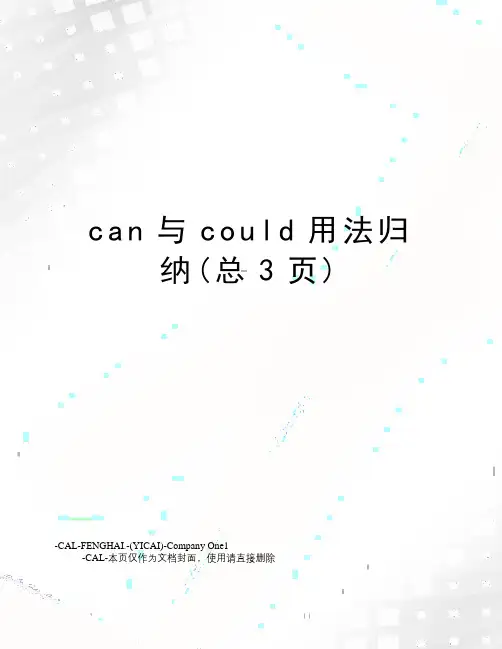
c a n与c o u l d用法归纳(总3页)-CAL-FENGHAI.-(YICAI)-Company One1-CAL-本页仅作为文档封面,使用请直接删除can与could用法归纳一、表示能力(1)表示现在的能力,用can:I can’t decide which to choose.我不能决定选哪个好。
While I sympathize, I can’t really do much to help.尽管我很同情,我却不能真正帮多少忙。
(2)表示将来的能力,通常不用can或could,而用be able to的将来时态:I’ll be able to speak French in an other few months.再过几个月我就会讲法语了。
One day people will be able to go to the moon on holiday.总有一天人们可以到月球上去度假。
但是,若表示现在决定将来是否有能力做某事,则可用can:Can you come to the party tomorrow?你明天能来参加我们的聚会吗?(3)表示过去的能力,有时可用could,有时不能用could,具体应注意以下几点:①若表示过去一般的能力(即想做某事就随时可做某事的能力),可用could:Could you speak English then?那时候你会说英语吗②若表示过去的特定能力(即在过去特定场合做某事的能力),则不能用could,而用was (were) able to do sth,或用managed to do sth,或用succeeded in doing sth 等。
He studied hard and was able to pass the exam.他学习很努力,所以考试能及格。
At last he succeeded in solving the problem.他终于把那个问题解决了。
实用英语语法:英语情态动词can与could在陈述句的用法

实用英语语法:英语情态动词can与could在陈述句的用法
can
(1)表示能力,一般翻译为“会,能”,主要指具备的能力。
He can swim fast,but I can't.他会游泳,但我不会。
(2)表示许可,常在口语中使用。
You can use my dictionary.你可以用我词典。
(3)表示推测,意为“可能”,常用于否定句和疑问句中,此时,can't翻译为“不可能”。
Can the news be true?这消息是真实的吗?
could
(1)can的过去式,翻译为“会,能”,表示过去具备的能力。
She could write poems when he was 9.她九岁的时候就会写诗了。
(2)could在疑问句中,表示委婉请求的语气,此时could没有过去式的意思。
Could you do me a favour?你可以帮我一个忙吗?。
情态动词can和could的用法
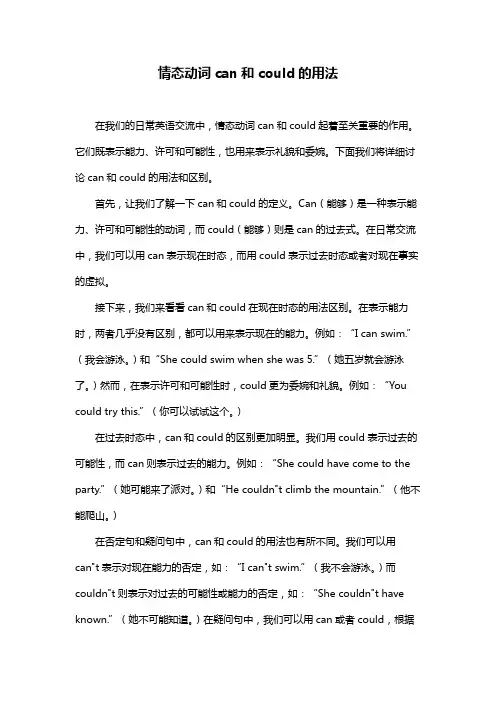
情态动词can和could的用法在我们的日常英语交流中,情态动词can和could起着至关重要的作用。
它们既表示能力、许可和可能性,也用来表示礼貌和委婉。
下面我们将详细讨论can和could的用法和区别。
首先,让我们了解一下can和could的定义。
Can(能够)是一种表示能力、许可和可能性的动词,而could(能够)则是can的过去式。
在日常交流中,我们可以用can表示现在时态,而用could表示过去时态或者对现在事实的虚拟。
接下来,我们来看看can和could在现在时态的用法区别。
在表示能力时,两者几乎没有区别,都可以用来表示现在的能力。
例如:“I can swim.”(我会游泳。
)和“She could swim when she was 5.”(她五岁就会游泳了。
)然而,在表示许可和可能性时,could更为委婉和礼貌。
例如:“You could try this.”(你可以试试这个。
)在过去时态中,can和could的区别更加明显。
我们用could表示过去的可能性,而can则表示过去的能力。
例如:“She could have come to the party.”(她可能来了派对。
)和“He couldn"t climb the mountain.”(他不能爬山。
)在否定句和疑问句中,can和could的用法也有所不同。
我们可以用can"t表示对现在能力的否定,如:“I can"t swim.”(我不会游泳。
)而couldn"t则表示对过去的可能性或能力的否定,如:“She couldn"t have known.”(她不可能知道。
)在疑问句中,我们可以用can或者could,根据语境选择。
例如:“Can you help me?”(你能帮我吗?)或者:“Could you help me?”(你能帮我吗?)最后,我们来看看一些常见的错误和实用建议。
can与could用法归纳
c a n与c o u l d用法归纳 Company Document number:WTUT-WT88Y-W8BBGB-BWYTT-19998can与could用法归纳一、表示能力(1)表示现在的能力,用can:I can’t decide which to choose.我不能决定选哪个好。
While I sympathize, I can’t really do much to help.尽管我很同情,我却不能真正帮多少忙。
(2)表示将来的能力,通常不用can或could,而用be able to的将来时态:I’ll be able to speak French in another few months.再过几个月我就会讲法语了。
One day people will be able to go to the moon on holiday.总有一天人们可以到月球上去度假。
但是,若表示现在决定将来是否有能力做某事,则可用can:Can you come to the party tomorrow你明天能来参加我们的聚会吗(3)表示过去的能力,有时可用could,有时不能用could,具体应注意以下几点:①若表示过去一般的能力(即想做某事就随时可做某事的能力),可用could:Could you speak English then那时候你会说英语吗②若表示过去的特定能力(即在过去特定场合做某事的能力),则不能用could,而用was (were) able to do sth,或用managed to do sth,或用succeeded in doing sth等。
He studied hard and was able to pass the exam.他学习很努力,所以考试能及格。
At last he succeeded in solving the problem.他终于把那个问题解决了。
(完整版)can、could用法练习.doc
Can/could 的用法1.can/could 都属于情,本身有各种意,具体在句子中不同。
2.情不能独作,只能和一起构成。
3.情没有人称和数量的化。
4.表示人的气和情感。
Can/could 的几种句式:肯定句否定句略式can can not can’tcould could not couldn ’t疑句:can you ⋯⋯ .?could you⋯...?Can/could 用法共同点:1.都表示具的能力,指在、去无什么候想做就能做到的能力。
Could 表示去的能力, can 表示在或将来的能力。
2.在否定句和疑句中,都表示猜气。
Can 表示猜的可能性要多些,而could 表示猜的可能性要小、些。
3.都可以表示建和求,can 表示肯定, could 的求气更委婉。
Can 与 could 用法不同点:1.can 的气肯定, could 气比委婉。
2.can 通常用在表示在的事情,3.could 用在表示去的事情。
4.当表示允人做某事,用can 而不用 could.一、判断下列句子的用法:1.A hen can’ t swim.2.How can that be true?3.Could you pass the paper to me?4.I couldn’ t play the piano until I was fifteen years old.5.What you said couldn’ruetbe. t6.Can I take this seat?7.Could I use your phone?8.Yes,of course you can.1二、选择题1. At that time we thought the story_____ not be true.A)could B)must C)can2. You___ the work better in the future.A)could did B)can do C)could do3.The room is dirty; it ____cleaned.A) can ‘ t be B) couldn’ t beC) mustn't be4.Mary ____my letter, because she is worring about it now.A) should receive B) can ’ t receive C) couldn't receive5.An Englishman who ____not speak Chinese in China.A) must B) could C) can6.Mr Wang ______ write last year, he was ill for three years.A. mustn ’ tB. couldn’Ct. can’t7. –Who is the man over there? Is it Mr Li?--No, it ______ be him. Mr Li is much taller.A. mustn ’ tB. could notC. can’ t8.Could I seat here?---Yes, of course you _______.A. canB.couldC.must三、按要求完成句子1.He can ride a bike. (改一般疑问句和否定句,并作肯定和否定回答)一般疑问句 _________________________________________否定句 _________________________________________肯定回答 ______________否定回答 ______________2.你会弹吉他吗?_____ you ___________ guitar?3.两年前我不会骑自行车。
情态动词can和could的用法
情态动词can和could主要用来表示能力,可能性许可征求对方意见的。
can 和could的用法主要有以下5条。
一、表示能力can表示有能力做,知道如何做或能够发生,意思是能,会。
could表示过去的能力。
The little baby can dress itself now.小宝宝可以给自己穿衣服了。
The girl could easily tell her mother's step,那个女孩很容易地判断出她妈妈的脚步声。
Mozart could play the piano at the age of three.莫扎特在三岁时就会弹钢琴了。
*用法比较:can与be able to的区别。
1.看只能在一般现在时与一般过去时两种时态中,be able to则可用于更多的时态。
I'm sorry,I haven't been able to answer your letter in time.真对不起,我能及时的给你回信。
2.Be able to后的动词一般不用被动形式而can则可以用被动形式。
The war can be painted.这个墙可以涂鸦了。
3.在过去时态中could仅只具备某种能力,但实施的结果不明确,而was/ were /were able to不仅说明有某种能力,而且还成功地做到了,相当于managedI talked with the boy for a long time and eventually I was able to make him believe me.我和那个男孩谈了很久,最终还是让他相信了我的话。
二、表示可能性1.用在肯定句中,表示理论上的可能性,指常有的行为或情形,意思是有时会……。
Tom can be really annoying.他们有时的确令人讨厌。
It can be very hot here in summer.这里夏天有时会很热。
can和could表推测的用法
can和could表推测的用法一、can和could的基本用法1. can和could在日常生活中常用来表达能力、许可和请求等意思,但它们在用于推测时也有其独特的用法。
2. can表示一种可能性或能力,而could则是can的过去式形式,表示更加委婉的可能性或能力。
3. We can go for a walk in the park.(我们可以去公园散步。
)这句话中的can表达的是一种可能性和能力,表示我们有能力去公园散步。
4. 再She could be at home by now.(她现在可能已经在家了。
)这句话中的could表示的是一种更加委婉的可能性,表示她有可能已经在家了。
二、can和could表推测的用法1. can和could在推测时常用来表示对事实或情况的猜测或推断。
2. It can't be true.(那不可能是真的。
)这句话中的can用来表达对某事情不可能性的推测。
3. 再She could have missed the tr本人n.(她可能错过了火车。
)这句话中的could表达了对她错过火车的推测。
4. can和could还可以用来表达对过去事件的推测,He could have taken the wrong turn.(他可能走错了路。
)5. can和could还可以用来表示对将来可能发生的事情的推测,It could r本人n tomorrow.(明天可能会下雨。
)三、can和could的注意事项1. 在一般现在时和一般将来时中,can和could用来表示推测时,其否定形式为can't和couldn't。
2. She can't be at home now.(她现在不可能在家。
)这句话中的can't表示推测的否定形式。
3. 而在一般过去时中,could的否定形式为couldn't,He couldn't have finished the work so fast.(他不可能这么快就完成了工作。
- 1、下载文档前请自行甄别文档内容的完整性,平台不提供额外的编辑、内容补充、找答案等附加服务。
- 2、"仅部分预览"的文档,不可在线预览部分如存在完整性等问题,可反馈申请退款(可完整预览的文档不适用该条件!)。
- 3、如文档侵犯您的权益,请联系客服反馈,我们会尽快为您处理(人工客服工作时间:9:00-18:30)。
Unit 4 can/could的用法
1.can/could都属于情态动词,
本身有各种意义,具体在句子中不同。
2.情态动词不能单独作谓语,
只能和动词一起构成谓语。
3.情态动词没有人称和数量的变化。
4.表示说话人的语气和情感。
Can/could的几种句式:
肯定句否定句缩略式
can can not can’t
could could not couldn’t
疑问句:
can you…….?
could you…...?
一、用can或could的相关形式填空
1. He swim and I sing.
2. She read and draw, but she write five years ago.
3. LiuTao play basketball when(当)he was a child.
4.I use the mobile phone until(直到) I was fifteen years old.
5. What could you do three years ago?
We ride a bike to school.
二、按要求完成句子
1. He can play the piano. (改一般疑问句和否定句,并作肯定和否定回答)否定句_________________________________________
一般疑问句_________________________________________
肯定回答______________否定回答______________
对划线部分提问:
2.你会弹吉他吗?
_____ you _____ ______ guitar?
3.两年前我不会骑自行车。
I ______ ______a bike two years ______.
4.十年前你会写字吗?不,我不会。
you ten years ago? No, I .
5.五年前你不会做什么?我不会游泳和画画。
What you five years ago? I swim and .
6. They couldn’t speak English twenty years ago.
一般疑问句:
肯定回答:否定回答:
对划线部分提问:。
